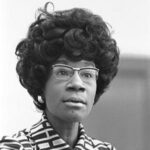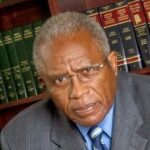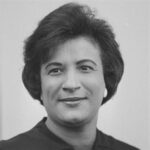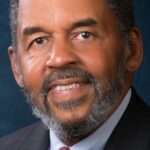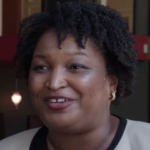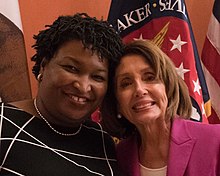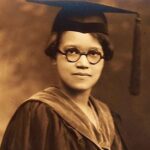Black History Month
Join Legal Innovators in celebrating contributors and opportunities for equity in the legal space.
Know the past, shape the future.
Brian Ellis joined Danaher as Senior Vice President and General Counsel in January 2016, bringing a wealth of experience leading and developing global legal teams and supporting business growth.
Brian leads Danaher’s global legal organization and ensures a strong culture of integrity and compliance. His areas of responsibility including corporate governance, quality assurance and regulatory affairs, sustainability, intellectual property and risk management as well as the company’s environment, health and safety group.
Brian was most recently General Counsel of Medtronic’s Restorative Therapies Group. In previous roles, he served as Chief Compliance Officer, and later General Counsel of Monitoring Solutions and Services, at GE Healthcare. Early in his career, he was a partner in private law firms and an Assistant U.S. Attorney for the Northern District of Illinois.
Brian received his undergraduate degree from Lake Forest College and his J.D. from University of Illinois College of Law. He lives in Bethesda, Maryland with his wife, Jeanette, and three children.
Source: Danaher
Bradley M. Gayton joined The Coca-Cola Company in 2020 as senior vice president and global general counsel, overseeing all legal and security functions.
Previously, Gayton served as group vice president, chief administrative officer and general counsel at Ford Motor Company where he managed a team of over 600 people across more than 20 countries with responsibility for the company’s litigation, tax, compliance, corporate and intellectual property efforts as well as company facilities and real estate. He advised the company’s board of directors and senior management on a wide range of legal issues and oversaw its General Auditor’s Office.
Gayton joined the company in 1991 and held a number of positions across the organization before being named General Counsel and elected a Ford Motor Company officer in 2016. The following year, Gayton was named Chief Administrative Officer which added responsibility over Ford Land and Corporate Services.
An outspoken corporate leader, Gayton is widely considered a leading advocate for advancements in legal technology, diversity and inclusion and equal justice for low-income citizens.
During this tenure at Ford Motor Company, Gayton fostered a culture of innovation in the legal group through a number of technology initiatives exploring the application of artificial intelligence and big data to create operational efficiency and enhanced solutions to complex legal issues. Gayton personally holds three patents and was named a 2020 Diversity in Tech and IP award recipient by the National Bar Association.
Gayton is regularly recognized by the legal industry for his leadership on issues of diversity and inclusion. After sponsoring the creation of the Legal Alliance of Women, Gayton instituted a number of initiatives impacting the hiring and career development process of his team as well as outside counsel. He also created the Ford Law Career Academy, a program that aims to add greater diversity to talent pipelines for future generations by introducing minority high school students to careers in law.
Gayton championed a culture of pro bono work across his team at Ford Motor Company and saw a significant increase in pro bono hours during his tenure. Personally, he has devoted much of his pro bono work to helping victims of domestic abuse and other crimes through U-Visa and received the National Legal Aid & Defender Association’s 2018 Exemplar Award as a result. Gayton also serves as an advisor to Vista Maria and Alternatives for Girls, organizations that serve vulnerable youth.
Gayton is a native of Syracuse, N.Y. He holds a bachelor’s degree in business and a law degree from the State University of New York at Buffalo.
Person subject to the reporting requirements of Section 16 of the Securities Exchange Act of 1934, as amended.
Source: Coca-Cola
Janica Pierce Tucker became general counsel for the Columbus Clippers in January, breaking baseball minor league history.
Last month Janica Pierce Tucker was named the general counsel for the Columbus Clippers, hitting a home run, not only for herself, but for Black women across the country.
“I became the first African-American female to be general counsel in the entire AAA baseball history,” said Tucker.
There are 160 minor league teams across the country and the league started in 1901.
“They’ve not had anybody across the entire country all these AAA teams…never,” she said.
Tucker is no stranger to breaking the mold. She graduated from law school from Ohio State University and is now the City of Columbus’ first Black woman to become managing partner of a law firm. She works at Taft Law in Capitol Square.
“My family is oh so proud, but they also understand as do I the importance of it. We are truly our ancestors wildest dreams. And what we have to remind ourselves of every day is that you can do whatever you set your mind to do,” she said.
Tucker became Partner in Charge in January 2020. She says there are five Black partners in the entire City of Columbus and estimates 10 to 12 Black female associates at law firms in the city.
Source: 10tv.com
Deborah N. Archer is an American civil rights lawyer and law professor. She is the Jacob K. Javits Professor at New York University and Professor of Clinical Law at New York University School of Law. She also directs the Center on Race, Inequality, and the Law and the Civil Rights Clinic at NYU School of Law. In January 2021, she was elected president of the American Civil Liberties Union (ACLU), becoming the first African American to hold the position in the organization’s 101 years of operating.
Early life
Archer was born to immigrants from Jamaica, becoming a first-generation citizen of the United States as well as the first in her family to attend college.[1] Archer attended Smith College, graduating with honors (cum laude) with a degree in government in 1993.[2] She graduated from Yale Law School in 1996.[2] At Yale, she won the Charles G. Albom Prize.[2]
Career
After graduating from Yale, Archer clerked for Judge Alvin Thompson on the US District Court for the District of Connecticut,[3] and the following year (1997 to 1998) was a Marvin M. Karpatkin legal fellow at the ACLU.[4] Archer was assistant counsel at the NAACP Legal Defense and Educational Fund from 1998 to 2000, and then an associate at the law firm Simpson Thacher & Bartlett from 2000 to 2003.[5]
In 2003, Archer joined the faculty of New York Law School (NYLS), where she was the first dean of diversity and inclusion and chief diversity officer, and associate dean for academic affairs and student engagement.[3] She led the school’s Racial Justice Project and the Impact Center for Public Interest Law, which she co-founded.[3]
Since 2009, she has been on the ACLU’s board, and since 2017 has been general counsel and a member of the board’s executive committee.[6] She is also a member of the board of the New York Civil Liberties Union.[7] In 2016 and again in 2017, Archer served as acting chair of the New York City Civilian Complaint Review Board, the body that investigates allegations of police misconduct.[8]
After 15 years at NYLS, Archer moved to New York University (NYU) in July 2018.[1] At NYU Archer is Jacob K. Javits Professor and Professor of Clinical Law, Co-Faculty Director of the Center on Race, Inequality, and the Law, and Director of the Civil Rights Clinic at New York University School of Law.[2]
ACLU president
On January 30, 2021, a remote meeting of the ACLU board elected Archer president of the organization, making her the first African American to hold the position in the organization’s 101-year history.[6][9] As its eighth president, she chairs the board of directors, setting the direction the organization takes in civil litigation policies.[4] (Day-to-day operations are the responsibility of ACLU executive director Anthony D. Romero.)[6] Archer succeeds Susan N. Herman, a professor at Brooklyn Law School and ACLU president since 2008, who oversaw a period of growth with increased donations following the election of President Donald Trump and extensive litigation during his administration.[6] In a statement on Archer’s election, Romero said that civil rights and racial justice were top priorities for the organization moving forward and noted Archer’s expertise in these fields.[6]
Honors
The Northeast People of Color Legal Scholarship Conference gave Archer the 2014 Haywood Burns/Shanara Guilbert Award and the Otto L. Walter Distinguished Writing Award.[2]
She was honored by the New York Law Journal which cited her as one of its Top Women in Law for 2016.[9]
Personal life
Archer is married to Richard Buery, former deputy mayor of New York City.[10] They live in Brooklyn with their two sons.[1]
Selected works
- Archer, Deborah N. (2009–2010). “Introduction: Challenging the School-to-Prison Pipeline”. New York Law School Law Review. 54: 867.
- Archer, Deborah N.; Williams, Kele S. (2005–2006). “Making America the Land of Second Chances: Restoring Socioeconomic Rights for Ex-Offenders”. New York University Review of Law & Social Change. 30: 527.
- Archer, Deborah N. (2013). “There Is No Santa Claus: The Challenge of Teaching the Next Generation of Civil Rights Lawyers in a Post-Racial Society”. Columbia Journal of Race and Law. 4: 55.
Source: Wikipedia
Shirley Anita St. Hill Chisholm was the first African American woman in Congress (1968) and the first woman and African American to seek the nomination for president of the United States from one of the two major political parties (1972). Her motto and title of her autobiography—Unbossed and Unbought—illustrates her outspoken advocacy for women and minorities during her seven terms in the U.S. House of Representatives.
Born in Brooklyn, New York, on November 30, 1924, Chisholm was the oldest of four daughters to immigrant parents Charles St. Hill, a factory worker from Guyana, and Ruby Seale St. Hill, a seamstress from Barbados. She graduated from Brooklyn Girls’ High in 1942 and from Brooklyn College cum laude in 1946, where she won prizes on the debate team. Although professors encouraged her to consider a political career, she replied that she faced a “double handicap” as both Black and female.
Initially, Chisholm worked as a nursery school teacher. In 1949, she married Conrad Q. Chisholm, a private investigator (they divorced in 1977). She earned a master’s degree from Columbia University in early childhood education in 1951. By 1960, she was a consultant to the New York City Division of Day Care. Ever aware of racial and gender inequality, she joined local chapters of the League of Women Voters, the National Association for the Advancement of Colored People (NAACP), the Urban League, as well as the Democratic Party club in Bedford-Stuyvesant, Brooklyn.
In 1964, Chisholm ran for and became the second African American in the New York State Legislature. After court-ordered redistricting created a new, heavily Democratic, district in her neighborhood, in 1968 Chisholm sought—and won—a seat in Congress. There, “Fighting Shirley” introduced more than 50 pieces of legislation and championed racial and gender equality, the plight of the poor, and ending the Vietnam War. She was a co-founder of the National Women’s Political Caucus in 1971, and in 1977 became the first Black woman and second woman ever to serve on the powerful House Rules Committee. That year she married Arthur Hardwick Jr., a New York State legislator.
Discrimination followed Chisholm’s quest for the 1972 Democratic Party presidential nomination. She was blocked from participating in televised primary debates, and after taking legal action, was permitted to make just one speech. Still, students, women, and minorities followed the “Chisholm Trail.” She entered 12 primaries and garnered 152 of the delegates’ votes (10% of the total)—despite an under-financed campaign and contentiousness from the predominantly male Congressional Black Caucus.
Chisholm retired from Congress in 1983. She taught at Mount Holyoke College and co-founded the National Political Congress of Black Women. In 1991 she moved to Florida, and later declined the nomination to become U.S. Ambassador to Jamaica due to ill health. Of her legacy, Chisholm said, “I want to be remembered as a woman … who dared to be a catalyst of change.”
Source: womenshistory.org
Carol Moseley-Braun Was the first African-American woman Senator and also only the second Black Senator since the Reconstruction Era. “I cannot escape the fact that I come to the Senate as a symbol of hope and change,” Moseley-Braun said shortly after being sworn in to office in 1993. “Nor would I want to, because my presence in and of itself will change the U.S. Senate.” During her single term in office, Senator Moseley-Braun advocated for civil rights issues and for legislation on crime, education, and families.
Carol Moseley was born in Chicago, Illinois, on August 16, 1947. Her parents, Joseph Moseley, a policeman, and her mother, Edna (Davie) Moseley, a medical technician, divorced in 1963. The oldest of the four Moseley children in a middle-class family, Carol graduated from Parker High School in Chicago and earned a BA in political science from the University of Illinois in 1969.3 Possessing an early interest in politics, she worked on the campaign of Harold Washington—an Illinois state representative, a U.S. Representative, and the first African-American mayor of Chicago—and the campaign of Illinois state senator Richard Newhouse.4 In 1972 Carol Moseley graduated from the University of Chicago School of Law. In Chicago she met and later married Michael Braun. Moseley-Braun hyphenated her maiden and married names. The couple raised a son, Matthew, but their marriage ended in divorce in 1986. Moseley-Braun worked as a prosecutor in the office of the U.S. Attorney in Chicago from 1973 until 1977. In 1978 she won election to the Illinois state house of representatives, a position she held for a decade. After an unsuccessful bid for Illinois lieutenant governor in 1986, she was elected the Cook County, Illinois, recorder of deeds in 1988, becoming the first African American to hold an executive position in Cook County.5
Not satisfied with her position as recorder of deeds, and believing politicians were out of touch with the average American, Moseley-Braun contemplated running for Congress. Her resolve to seek national office strengthened after she witnessed Senators dismissively question Anita Hill during Clarence Thomas’s controversial confirmation hearing for the Supreme Court in 1991. “The Senate absolutely needed a healthy dose of democracy,” she observed. “It wasn’t enough to have millionaire white males over the age of 50 representing all the people in the country.”6 Officially entering the race for the Senate in November 1991, Moseley-Braun focused her Democratic primary campaign on two-term incumbent Alan John Dixon’s support of Clarence Thomas’s appointment and the need for diversity in the Senate. Despite organizational problems and paltry fundraising, Moseley-Braun stunned the experts, defeating her two opponents, Dixon and Alfred Hofeld, an affluent Chicago lawyer, by capturing 38 percent of the primary vote.7 “This democracy is alive and well, and ordinary people can have a voice with no money,” Moseley-Braun remarked shortly afterward.8 In the general election, she faced Republican candidate Richard Williamson, a lawyer and a former official in the Ronald Reagan and George H. W. Bush administrations.9 Focusing on a message of change and diversity encapsulated by slogans such as, “We don’t need another arrogant rich guy in the Senate,” Moseley-Braun ultimately defeated Williamson with 53 percent of the vote.10 In the “Year of the Woman,” Carol Moseley-Braun became a national symbol of change, reform, and equality. Soon after her election to the Senate, she commented, “my job is emphatically not to be a celebrity or a full time symbol. Symbols will not create jobs and economic growth. They do not do the hard work of solving the health care crisis. They will not save the children of our cities from drugs and guns and murder.”11
In the Senate, Moseley-Braun became the first woman to serve on the powerful Finance Committee when a top-ranking Democrat, Thomas Andrew Daschle of South Dakota, gave up his seat to create a spot for her. Also, Moseley-Braun and Senator Dianne Feinstein of California became just the second and third women ever to serve on the prestigious Senate Judiciary Committee. In addition, Moseley-Braun served on the Senate Banking, Housing, and Urban Affairs Committee and on the Small Business Committee. In 1993, the Illinois Senator made headlines when she convinced the Senate Judiciary Committee not to renew a design patent for the United Daughters of the Confederacy (UDC) because it contained the Confederate flag. The patent had been routinely renewed for nearly a century, and despite the Judiciary Committee’s disapproval, the Senate was poised to pass a resolution sponsored by Senator Jesse Helms of North Carolina that included a provision to authorize the extension of the federal patent. Moseley-Braun threatened to filibuster the legislation “until this room freezes over.” She also made an impassioned and eloquent plea to her colleagues about the symbolism of the Confederate flag, declaring, “It has no place in our modern times, place in this body, place in our society.”12 Swayed by Moseley-Braun’s argument, the Senate rejected the UDC’s application to renew its patent.13
Moseley-Braun sparred with Senator Helms once again while managing her first bill on the Senate Floor. As a cosponsor of a measure providing federal funding for the Martin Luther King Jr. Holiday Commission—an organization established in 1984 to promote national recognition of the holiday—Moseley-Braun helped thwart a Helms amendment to the legislation that would have replaced government money with private donations. The Illinois Senator invoked memories of her participation in a civil rights march with King in the 1960s to win support for the legislation.14 The Senate eventually approved the bill. Among Moseley-Braun’s other triumphs were her prominent roles in the passage of the Child Support Orders Act, the 1994 William J. (Bill) Clinton administration crime bill, the Multiethnic Placement Act, and the Improving America’s Schools Act.15
During her term in the Senate, Moseley-Braun addressed an array of issues affecting women and African Americans. She helped create legislation to assist divorced and widowed women, arguing, “Pension laws were never written for women … no wonder the vast majority of the elderly poor are women.”16 She also sponsored the creation of the Sacagawea coin to recognize women of color and a National Park Service initiative to fund historic preservation of the Underground Railroad.17 A consistent supporter of equal opportunity and affirmative action, Moseley-Braun also spoke out against sexual harassment. In 1995 she joined five of her women colleagues in the Senate to call for public hearings on alleged sexual misconduct by Senator Robert William Packwood of Oregon.18
Despite the high expectations following Moseley-Braun’s upset victory in 1992, her term in the Senate was marked by controversy. Moseley-Braun drew criticism for alleged campaign finance violations, but such charges were later dismissed when a five-year investigation by the Federal Election Commission turned up only a minor discrepancy of $311.19 In 1996 the Congressional Black Caucus and human rights organizations chastised Moseley-Braun for taking a private trip to Nigeria to attend the funeral of General Sani Abacha’s son despite objections by the State Department. Previously an outspoken critic of human rights violations in the African nation, Moseley-Braun reversed her position and defended the Nigerian government.20
Closely scrutinized, Moseley-Braun faced a difficult challenge in her 1998 bid for re-election to the Senate against Republican Peter G. Fitzgerald, an Illinois state senator.21 Capturing just 47 percent of the vote, Moseley-Braun lost to her opponent, who spent nearly $12 million of his own money.22 President Clinton appointed Moseley-Braun the U.S. Ambassador to New Zealand; she served from 1999 until 2001. Attempting to revive her political career, Moseley-Braun entered the race for the Democratic nomination for President in 2000, but she was unsuccessful. It was the second time an African-American woman had sought the nomination (Representative Shirley Chisholm of New York became the first in 1972). Since 2001 Moseley-Braun has taught political science at Morris Brown College (Atlanta) and DePaul University (Chicago) and managed a business consulting company in Chicago.23 In 2004 Moseley-Braun made another unsuccessful bid for the Democratic presidential nomination.
Source: history.house.gov
Charles Hamilton Houston started out as an English professor. However, he experienced such blatant bigotry while serving in the U.S. Infantry as a First Lieutenant during World War I, he decided to “study law and use my time fighting for men who could not strike back.” Houston enrolled at Harvard Law, becoming the first black American to be the editor of the Harvard Law Review. In 1923, he earned his Juris Doctor degree, and in 1924, joined the Washington, D.C. bar.
Houston later became dean of Howard University School of Law, and he made that institution the leading training center for civil rights activists pursuing law.
During this time, he also served the first special counsel for the National Association for the Advancement of Colored People (NAACP). In that role, Houston was involved in almost every Supreme Court case between 1930 and 1950 that involved civil rights. He wrote the strategy to end segregation in public schools by proving that it would be more expensive to create “separate but equal” schools than it was to allow integration.
Source: Lawworks.com
Fred Gray As a colleague of and eventual attorney for Martin Luther King Jr., Fred Gray was active in the civil rights movement. Gray was born in 1930 and raised in a segregated black division of Montgomery, Alabama. He earned his undergraduate degree from Alabama State College while also working as the district manager of the Alabama Journal. After earning his JD from Case Western Reserve University, he opened his own law firm in Montgomery.
Gray represented Claudette Colvin and Rosa Parks when they received charges of disorderly conduct for refusing to give up their bus seats to white passengers. He was instrumental to the Montgomery bus boycott, serving as an attorney in the civil suit Browder v. Gayle that eventually integrated the city’s buses. In 1970, Gray became one of the first two African-American legislators to be elected in Alabama since the Reconstruction era.
Gray continues to practice law as a senior partner at Gray, Langford, Sapp, McGowan, Gray & Nathanson in Alabama. He was born in 1930.
For more on Gray, check out our Modern Law Library podcast from 2013, in which we spoke to him about his civil rights memoir and his time serving as Rosa Parks’ attorney.
Source: ABAJOURNAL
Constance Baker Motley Appointed to the U.S. District Court for the Southern District of New York in 1966, Constance Baker Motley was the first African-American woman to join the federal judiciary. Leading up to her appointment, Motley maintained an impressive track record for cases argued before the Supreme Court. Through her work as the first female attorney for the NAACP Legal Defense and Educational Fund, she won nine out of the 10 cases that she argued.
Motley may have lost in Swain v. Alabama, but the Supreme Court eventually overruled the decision in Batson v. Kentucky. Motley also wrote the original complaint for Brown v. Board of Education.
With 20 years of NAACP experience under her belt, Motley moved into the political arena in 1964, becoming the first African-American female state senator in New York. A year later, Motley was elected as the first female president of the Manhattan borough, before moving on to the federal judiciary. She was born in 1921 and died of congestive heart failure in 2005.
Source: ABAJOURNAL
Barack Hussein Obama II born August 4, 1961 is an American politician and attorney who served as the 44th president of the United States from 2009 to 2017. A member of the Democratic Party, Obama was the first African-American president of the United States. He previously served as a U.S. senator from Illinois from 2005 to 2008 and as an Illinois state senator from 1997 to 2004.
Obama was born in Honolulu, Hawaii. After graduating from Columbia University in 1983, he worked as a community organizer in Chicago. In 1988, he enrolled in Harvard Law School, where he was the first black person to be president of the Harvard Law Review. After graduating, he became a civil rights attorney and an academic, teaching constitutional law at the University of Chicago Law School from 1992 to 2004. Turning to elective politics, he represented the 13th district from 1997 until 2004 in the Illinois Senate, when he ran for the U.S. Senate. Obama received national attention in 2004 with his March Senate primary win, his well-received July Democratic National Convention keynote address, and his landslide November election to the Senate. In 2008, he was nominated by the Democratic Party for president a year after his presidential campaign began, and after a close primary campaign against Hillary Clinton, Obama was elected over Republican nominee John McCain and was inaugurated alongside his running mate, Joe Biden, on January 20, 2009. Nine months later, he was named the 2009 Nobel Peace Prize laureate.
Obama signed many landmark bills into law during his first two years in office. The main reforms that were passed include the Affordable Care Act (commonly referred to as ACA or “Obamacare”), although without a public health insurance option, the Dodd–Frank Wall Street Reform and Consumer Protection Act, and the Don’t Ask, Don’t Tell Repeal Act of 2010. The American Recovery and Reinvestment Act of 2009 and Tax Relief, Unemployment Insurance Reauthorization, and Job Creation Act of 2010 served as economic stimuli amidst the Great Recession. After a lengthy debate over the national debt limit, he signed the Budget Control and the American Taxpayer Relief Acts. In foreign policy, he increased U.S. troop levels in Afghanistan, reduced nuclear weapons with the United States–Russia New START treaty, and ended military involvement in the Iraq War. He ordered military involvement in Libya for the implementation of the UN Security Council Resolution 1973, contributing to the overthrow of Muammar Gaddafi. He also ordered the military operations that resulted in the deaths of Osama bin Laden and suspected Yemeni Al-Qaeda operative Anwar al-Awlaki.
After winning re-election by defeating Republican opponent Mitt Romney, Obama was sworn in for a second term in 2013. During this term, he promoted inclusion for LGBT Americans. His administration filed briefs that urged the Supreme Court to strike down same-sex marriage bans as unconstitutional (United States v. Windsor and Obergefell v. Hodges); same-sex marriage was legalized nationwide in 2015 after the Court ruled so in Obergefell. He advocated for gun control in response to the Sandy Hook Elementary School shooting, indicating support for a ban on assault weapons, and issued wide-ranging executive actions concerning global warming and immigration. In foreign policy, he ordered military intervention in Iraq in response to gains made by ISIL after the 2011 withdrawal from Iraq, continued the process of ending U.S. combat operations in Afghanistan in 2016, promoted discussions that led to the 2015 Paris Agreement on global climate change, initiated sanctions against Russia following the invasion in Ukraine and again after Russian interference in the 2016 United States elections, brokered the JCPOA nuclear deal with Iran, and normalized U.S. relations with Cuba. Obama nominated three justices to the Supreme Court: Sonia Sotomayor and Elena Kagan were confirmed as justices, while Merrick Garland faced partisan obstruction from the Republican-led Senate led by Mitch McConnell, which never held hearings or a vote on the nomination. Obama left office in January 2017 and continues to reside in Washington, D.C.[2][3]
During Obama’s term in office, the United States’ reputation abroad, as well as the American economy, significantly improved.[4] His presidency has generally been regarded favorably, and evaluations of his presidency among historians, political scientists, and the general public frequently place him among the upper tier of American presidents.
Source: Wikipedia
Charlotte E. Ray (January 13, 1850 – January 4, 1911) was an American lawyer. She was the first black American female lawyer in the United States. Ray graduated from Howard University School of Law in 1872. She was also the first female admitted to the District of Columbia Bar, and the first woman admitted to practice before the Supreme Court of the District of Columbia. Her admission was used as a precedent by women in other states who sought admission to the bar.
Ray opened her own law office, advertising in a newspaper run by Frederick Douglass.[5] However, she practiced law for only a few years because prejudice against African Americans and women made her business unsustainable.[6] Ray eventually moved to New York, where she became a teacher in Brooklyn. She was involved in the women’s suffrage movement[7] and joined the National Association of Colored Women.[8]
Early life
Charlotte Ray was born in New York City to Charlotte Augusta Burroughs and Reverend Charles Bennett Ray. Reverend Ray was an important figure in the abolitionist movement and edited a newspaper called The Colored American. Charlotte had six siblings, including two sisters, Henrietta Cordelia and Florence. Education was important to her father, who made sure each of his girls went to college. Charlotte attended a school called the Institution for the Education of Colored Youth in Washington, D.C., graduating in 1869.[9] It was one of a few places where a black woman could gain proper education.
After this Ray became a teacher at Howard University in the Normal and Preparatory Department, which was the University’s Prep School. While teaching at Howard, she registered in the Law Department, as C. E. Ray.[9] Charlotte Ray graduated on February 27, 1872, completing a three-year program, as the first woman to graduate from the Howard University School of Law. Sources claim she graduated Phi Beta Kappa,[10] but Howard University did not receive its Phi Beta Kappa chapter until 1953.[11]
While in law school she is believed to have specialized in corporate law. She has been identified as the woman referred to by General O. O. Howard, the founder and first president of Howard University, as having “read us a thesis on corporations, not copied from the books but from her brain, a clear incisive analysis of one of the most delicate legal questions.”[7] Others suggest that Mary Ann Shadd Cary was the person in question.[12]
Admission controversy
She was admitted to the Howard School of Law in the District of Columbia in 1872 because she applied under the name “C. E. Ray” and that Ray used an alternate name to disguise her gender so that her admission would not be instantly revoked.[13] According to others, her use of initials is not proven, and it would not have been needed, because Howard University at this time had a clearly articulated policy of acceptance of both Black men and women.[9]
Independent practice
Ray was admitted to the District of Columbia Bar on March 2, 1872, and admitted to practice in the Supreme Court of the District of Columbia on April 23, 1872.[7][14] Her appointment was noted in the Woman’s Journal and gained her inclusion as one of the Women of the Century.[15] Ray began her independent practice of commercial law in 1872, advertising in newspapers such as the New National Era and Citizen, owned by Frederick Douglass.[4][5] Some sources suggest that she hoped to specialize in real estate law, which would involve fewer appearances in court.[7]
Nonetheless, there is evidence that she was active in court. She was the first woman to practice and argue in the District of Columbia Supreme Court,[3] where she pleaded the case of Gadley v. Gadley (vt. Godling v. Godling), No. 4278, filed June 3, 1875. In this case, she defended an uneducated woman petitioning for divorce from an abusive husband. The arguments were based on the grounds of “habitual drunkenness” and “cruelty of treatment, endangering the life or health of the party complaining”. Ray’s petition vividly evokes the violence of the marriage, describing an incident in which the husband first broke the bedstead, so that the wife lay down on the floor, and then “went down stairs, got an ax and returning, ripped up the planks in the floor”, with the intention of causing his wife to fall through and break her neck.[9][16]
Charlotte Ray was said to be eloquent, authoritative, and “one of the best lawyers on corporations in the country.”[4][17][18] Yet despite her Howard connections and advertisements, she was unable to maintain a steady client flow, sufficient to support herself. Regardless of her legal knowledge and corporate law expertise, not enough people were willing to trust a black woman with their cases.[6][7] Wisconsin lawyer Kate Kane Rossi, in 1897, recalled that “Miss Ray … although a lawyer of decided ability, on account of prejudice was not able to obtain sufficient legal business and had to give up … active practice.”[7][19] Instead she returned to teaching, working in the Brooklyn school system.[7]
Personal life
Poet Henrietta Cordelia Ray was her sister. At one point all three sisters were teachers. Charlotte gave up teaching for a period to practice law, and Henrietta Cordelia gave up teaching to obtain her masters and write poetry.[20]
Ray attended the National Woman Suffrage Association‘s New York convention in 1876.[21] After 1895 Ray seems to have been active in the National Association of Colored Women.[9]
She married in the late 1880s and became Charlotte E. Fraim.[9]
In 1897 she moved to Woodside, Long Island, where she died of a severe case of bronchitis at the age of 60 on January 4, 1911.[9][20][21]
Posthumous honors
In March 2006, the Northeastern University School of Law (Boston, MA) chapter of Phi Alpha Delta Law Fraternity International chose to honor Ray by naming their newly chartered chapter after her, in recognition of her place as the first female African-American attorney.[22]
Source: Wikipedia
Paulette Brown is a member of the labor & employment practice group of Locke Lord LLP and is the Immediate Past President of the American Bar Association. Throughout her career, she has held a number of positions, including in-house counsel to a number of Fortune 500 companies and as a Municipal Court Judge. For the past 30 years, Paulette has engaged in the private practice of law, focusing on all facets of labor and employment and commercial litigation. She has defended employers in cases involving discrimination on the basis of age, sex, marital status, sexual harassment, disability, race and national origin. Paulette has received results in class action employment discrimination cases based upon race and wage and hour claims.
Paulette litigates in both federal and state courts, as well as arbitration forums for both unionized and non-union employees. She is a certified mediator for the United States District Court, District of New Jersey and a member of the Employment AAA Panel. Paulette is a frequent lecturer on labor and employment issues and issues related to electronic discovery and serves as Chair of the Labor and Employment Section of the New Jersey State Bar Association. She is also a member of the College of Labor & Employment Lawyer and American Law Institute. Additionally, Paulette has been recognized by the New Jersey Law Journal as one of the prominent women and minority attorneys in the State of New Jersey and by the National Law Journal as one of “The 50 Most Influential Minority Lawyers in America.” She has been listed as a NJ Super Lawyer since its inception and for the past three years as one of the top 50 women lawyers and one of the top 100 lawyers. Ms. Brown has also repeatedly been named by US News as one of The Best Lawyers in America® in the area of Commercial Litigation. Paulette also received DRI’s Pioneer Diversity Award and the NJ State Bar Association’s Excellence in Diversity Award, and she was honored with the Spirit of Excellence and Margaret Brent Women Lawyers of Achievement Awards by the American Bar Association Commission on Women in the Profession. In 2014, Paulette was honored by the Rutgers Law-Camden Black Law Students Association for exemplifying the values advocated by Dr. Martin Luther King Jr.
- Obtained recent summary judgments in ADA matters in both Federal and State Court
- Obtained recent summary judgment in CEPA matter in State Court
- Obtained recent summary judgment on Fraud and Breach of Employment Agreement
- Obtained a ruling sustaining the termination in an arbitration concerning the termination of a union employee for a major manufacturer
- Obtained a settlement on behalf of a major service provider in an unfair labor practices matter concerning union organizing before the NLRB
- Obtained a TRO and preliminary injunction against the Port Authority of New York and New Jersey on behalf of a rental car company in an airport taxing matter
- Reached a nominal settlement on behalf of employer for all class members in a class action employment matter filed by the EEOC
- Persuaded plaintiffs to amend their complaint to remove all class allegations in a class action employment matter
- Achieved summary judgment as to all claims asserted against a large manufacturer of medical equipment in a tortious interference matter
- Achieved summary judgment for an employer with respect to all plaintiffs, despite alleged inappropriate comments such as references to attendance at “nude” beaches and comments related to plaintiffs’ physical attributes in consolidated sexual harassment cases
Source: Locke Lord
Tatiana Hyman is a J.D. Candidate at Fordham University School of Law in New York City. Tatiana graduated from the University of Pennsylvania in 2017 with a B.A. in Criminology and minors in Africana Studies and African Studies. As a first-generation college graduate, Tatiana is passionate about mentorship, educational equity, and leveraging her educational and professional experiences to empower underrepresented students.
Experience
The Fordham Law Review
-
- Editor-in-Chief, Vol. 90
- Staff Member
Vinson & Elkins
-
- Summer Associate
- SEO Law Fellow
Morgan Stanley
-
- Compliance Analyst, ISG Regulatory Counsel and Strategy
- Compliance Analyst, Bank Regulatory Testing Team
- Compliance Summer Analyst, Global Financial Crimes – Anti-Money
University of Pennsylvania
-
- Career Services, Administrative Assistant
Office of the New York State Attorney General
-
- Mediator, Bureau of Consumer Frauds and Protection
Proskauer Rose LLP
-
- Diversity and Inclusion Intern
University of Pennsylvania
-
- Sociology Research Assistant
Wachtell, Lipton, Rosen & Katz
-
- InterAction Data Steward
Office of Mayor Michael Bloomberg, NYC Service
-
- Summer of Service Intern
Education
- Fordham University School of Law – Doctor of Law – JD · (2019 – 2022)
- University of Pennsylvania – Bachelor’s Degree, Criminology, Magna Cum Laude with Distinction, Minors:Africana Studies and African Studies · (2013 – 2017)
- The Loomis Chaffee School – High School Diploma · (2009 – 2013)
Source : LinkedIn
Michelle P. Wimes, JD, a leading expert in diversity, has been named Senior Vice President and Chief Equity and Inclusion Officer of Children’s Mercy.
In this role, Wimes will develop an equity and inclusion strategy that represents the perspective of patients, families, employees, community partners and suppliers. She will be a strategic advisor and educator to Children’s Mercy; use data to assess cultural competency and develop action plans to close gaps; and collaborate with leadership to address health disparity and foster a workplace culture of inclusion.
Wimes holds a J.D. degree from Tulane Law School, completed graduate studies at the University of Seville in Spain, and earned undergraduate degrees from the University of Missouri in Communication Arts and Spanish Language and Literature. She joins Children’s Mercy from Ogletree, Deakins, Nash, Smoak & Stewart, PC, one of the nation’s largest labor and employment law firms where, as Chief Diversity and Professional Development Officer, she led efforts to attract, develop and promote a diverse group of attorneys across the firm’s 53 offices. She previously practiced law at marquee law firms in Kansas City, handling employment, immigration and civil rights litigation, providing counsel to public school districts and using her language skills in Spanish and Portuguese to defend clients in suits filed in U.S. and Latin American courts.
Wimes is nationally known for her writings and presentations on professional development and diversity and inclusion in the workplace. In the community, she currently serves on the board of the University of Missouri Kansas City. Throughout her career, Michelle has held board and committee positions for dozens of non-profit organizations addressing education, domestic violence, health care and the arts.
Source: Children’s Mercy
Kenneth C. Frazier has served as the chairman of the board and chief executive officer of Merck since 2011.
Under Ken’s leadership, Merck is delivering innovative lifesaving medicines and vaccines as well as long-term and sustainable value to its multiple stakeholders. Ken has substantially increased Merck’s investment in research, including early research, while refocusing the organization on the launch and growth of key products that provide benefit to society. He has also led the formation of philanthropic and other initiatives that build on Merck’s 125-year plus legacy.
Ken joined the company in 1992 and has held positions of increasing responsibility including General Counsel and President. Prior to joining Merck, Ken was a partner with the Philadelphia law firm of Drinker Biddle & Reath. Ken’s contributions, especially in the legal, business and humanitarian fields, have been widely recognized. He sits on the boards of PhRMA, Weill Cornell Medicine, Exxon Mobil Corporation, Catalyst and Cornerstone Christian Academy in Philadelphia, PA. He is co-founder and co-chair of OneTen, a coalition of leading organizations committed to upskilling, hiring, and promoting one million Black Americans into family-sustaining jobs. OneTen is committed to facilitating a meaningful, measurable, and lasting impact on racial and economic justice. Ken also is a member of the American Academy of Arts and Sciences, the American Philosophical Society, The Business Council, the Council of the American Law Institute, and the American Bar Association. Additionally, Ken is co-chair of the Legal Services Corporation’s Leaders Council.
As a strong advocate for social justice and economic inclusion, Mr. Frazier is the recipient of numerous awards and honors, including the Anti-Defamation League Courage Against Hate Award, the Botwinick Prize in Business Ethics from Columbia Business School, the Legend in Leadership Award from the Yale School of Management, the NAACP Legal Defense and Educational Fund National Equal Justice Award, and the National Minority Quality Forum’s Lifetime Achievement Award. In 2018, Mr. Frazier was named one the World’s Greatest Leaders by Fortune Magazine. In 2019, he became the first recipient of the Forbes Lifetime Achievement Award for Healthcare.
Ken received his bachelor’s degree from The Pennsylvania State University and holds a J.D. from Harvard Law School.
Source: MERK
Vernā Myers is a cultural change catalyst, influencer, thought leader, social commentator, and author. She’s known for her high-energy keynotes, her captivating insights, and her ability to help people bridge differences and connect more meaningfully.
A Harvard-trained lawyer and founder of The Vernā Myers Company, Vernā is also the VP, Inclusion Strategy at Netflix where she leads her team in devising and implementing strategies that integrate cultural diversity, inclusion and equity into all aspects of Netflix’s operations worldwide.
Vernā is the author of the best-selling books: Moving Diversity Forward: How to Go From Well-Meaning to Well-Doing and What If I Say the Wrong Thing? 25 Habits for Culturally Effective People. Her inspiring TED talk, “How to Overcome Our Biases? Walk Boldly Toward Them,” offers three ways any person can become an active participant in countering bias in themselves and in others to create a more just world. Vernā has been featured on CNN and cited in numerous publications including The Atlantic, Bloomberg BNA, Business Insider, Forbes, Fortune, Harvard Business Review, Refinery29, Real Simple, Shape Magazine and TED NPR Radio to name a few.
For the last two decades, Vernā and The Vernā Myers Company have helped organizations eradicate barriers based on race, ethnicity, gender, sexual orientation and other differences with the aim of establishing a new, more productive and just status quo. As Vernā puts it, Diversity is being invited to the party. Inclusion is being asked to dance.®
Interested in bringing Vernā Myers into your organization? Vernā’s carefully curated topics on unconscious bias, anti-racism, cultural competency, and allyship provide a unique opportunity for employees and leaders to better understand how issues in today’s society impact our organizations and daily interactions both personally and professionally. Vernā also provides insight into the skills needed to work towards a more inclusive workplace.
Source: vernamyers.com
David Baker Lewis served as Chairman and Chief Executive Officer of the Firm from 1972 to 1982 and 2004 to 2010. With more than four decades of experience in municipal finance, David is widely respected as an expert in municipal bonds, including revenue bonds, general obligation bonds, certificates of participation, bond offerings, bond purchase agreements, special tax bonds, state revolving bond funds, cash-flow borrowings, industrial development bonds and performing due diligence. As co-founder of Lewis & Munday, David is a visionary who led the Firm to become the first minority-owned law firm listed in The Bond Buyer’s Directory of Municipal Bond Dealers (the “Red Book”). With David’s leadership, the Firm is consistently nationally recognized as one of the top bond counsel firms in the United States.
AREAS OF PRACTICE – Municipal Finance, Municipal Bond Offerings, and Corporate Services.
BAR ADMISSIONS – Michigan, District of Columbia
EDUCATION – JD, University of Michigan Law School; MBA, University of Chicago Booth School of Business; BA, Oakland University
COURT ADMISSIONS
- United States Supreme Court
- U.S. Court of Appeals for the Sixth Circuit
- U.S. District Court, Eastern District of Michigan
HONORARY DEGREES
- Doctor of Human Letters, University of Detroit-Mercy
- Doctor of Public Service, Central Michigan University
PROFESSIONAL ACTIVITIES
- National Association of Bond Lawyers, 1979-Present
- Board of Directors, 1993-1995
- Steering Committee, Bond Attorneys Workshop, 1979, 1989
- Vice-Chairman, Standing Committee on Education, 1988-1989
- Special Committee on Engagement of Bond Counsel, 1988
- NABL Nominating Committee, 1996
- National Association of Securities Professionals, 1985-Present
- Board of Directors, 1985-2004
- General Counsel, 1985-Present
- Secretary, 1985-1987
- Chair-Elect, 1987-1988
- Chair, 1988-1989
- Executive Committee, 1985-2004
- State of Michigan Attorney Discipline Board, 1978-1983
- Member, Judicial Conference of the United States Committee on the Bicentennial of the Constitution
CORPORATE BOARD MEMBERSHIPS
- The Detroit Edison Securitization Funding LLC
- Board of Managers, 2001-Present
- The Kroger Company, 2002-2015
- Board of Directors, 2002-2015
- Social Responsibility Committee, 2002-2015
- Vice Chairman, 2004-2014
- Audit Committee, 2002; Chairman, 2003-2010
- Finance Committee, 2010-2014
- Nominating and Governance Committee, 2014-2015
- H & R Block, 2004-Present
- Board of Directors, 2004-Present
- Governance and Nominating Committee, 2007-Present
- Audit Committee, 2004-2014
- Chairman, 2007-2014
- Finance Committee, 2005-2007
- Compensation Committee, 2014-Present
- GM-UAW Retiree Medical Benefits Trust [Chrysler, Ford, GM]
- Governing Committee, 2010-Present
- Audit Committee, 2010-Present
- Chair, 2010-Present
- The Skillman Foundation
- Board of Trustees, 2006; Vice Chairman, 2006-2009; Chair, 2009-2012
- External Relations Committee, 2014
- Program Policy Committee, 2006-2014
- Governance Committee, 2006-2012
- Audit Committee, 2006-2012
- STERIS Corporation
- Board of Directors, 2010-Present
- Audit Committee, 2010-Present
- Chair, 2015-Present
- Nominating and Governance Committee, 2012-Present
- The Police Foundation, 2004-2013
- Oakland University
- Charter Board of Trustees, 1970 – 1982
- Chairman, 1978 – 1982
- Chairman, Presidential Search Committee, 1980 – 1982
- Consolidated Rail Corporation (Conrail, Inc.)
- Board of Directors, 1989-1998
- Audit Committee, 1989-1998; Chairman, 1992-1998
- Ethics Committee, 1989-1994
- Nominating Committee, 1992-1995
- Comerica, Inc.
- Board of Directors, 1995-2004
- Audit and Legal Committee, 1995-2000
- Trust and Investment Committee, 1995-2004; Chairman, 2000-2004
- Public Responsibility Committee, 2003-2004
- TRW, Inc.
- Board of Directors, 1995-2002
- Compensation and Stock Option Committee, 1995-2002
- Retirement Funding Committee, 1995-2002
- M.A. Hanna Company
- Board of Directors, 1997-2000
- Audit Committee, 1998-2000
- Finance Committee, 1998-2000
- LG&E Energy Corporation
- Board of Directors, 1992-2000
- Audit Committee, 1992-2000; Chairman, 1996-2000
- Nomination and Development Committee, 1992-2000
HONORS + AWARDS
- American Jewish Committee Learned Hand Award, 1995
- Spirit of Giving Award, Franklin-Wright Settlement, Inc., 2007
- Zenobia Payne-Drake Humanitarian Award, 2007
- Alfred G. Wilson Award, Outstanding Contribution to the Life of the University, Oakland University, 1965
Source: Lewis&Munday
Shauna Johnson Clark is Norton Rose Fulbright’s Global and US Chair as well as its Head of Employment and Labor, United States. Joining the firm in 1994, she served as the Partner-in-Charge of the Houston office from 2011 until 2013. A nationally recognized expert in labor and employment law, Shauna was certified by the Texas Board of Legal Specialization for Labor and Employment Law in 2003.
Shauna is a trusted advisor to clients in a wide variety of industries, from energy and utility entities to healthcare and consumer products providers to banking and finance. Shauna is committed to providing the highest quality service in a timely and cost-efficient manner to each client she represents. She offers a broad range of services to employers, ranging from preventive advice and training to aggressive litigation when a mutually agreeable settlement cannot be reached.
Clients often trust Shauna to conduct thoughtful and effective workplace investigations involving allegations of harassment, hostile work environments, discrimination, retaliation, whistleblowing, and violation of company policies. She skilfully navigates investigations of sensitive allegations against high-ranking employees, including senior executives and general counsel.
Shauna provides strategic advice to employers on best practices, conducts management and employee training, and counsels clients on the full spectrum of employment issues. She counsels clients seeking to establish or update their diversity and inclusion programs, including providing comprehensive reviews of worldwide diversity and inclusion programs.
Shauna has led teams in jury, bench and administrative trials under all employment law statutes, including class and collective actions under Title VII, the Americans with Disabilities Act, and the Fair Labor Standards Act.
Professional experience
JD, cum laude, Tulane Law School, 1994
BA, Political Science, Louisiana State University, 1990
- Texas State Bar
- Co-led a nine-month Securities and Exchange Commission (SEC) investigation involving allegations of harassment and misconduct by senior employees; following Shauna’s discerning reports to the company’s board of directors and to the SEC, the SEC dismissed the complaint
- Conducted board-directed confidential investigation of allegations of misconduct lodged by deputy general counsel against general counsel of an oil services company
- At the direction of the CEO of an oil services company, conducted a confidential investigation, including performance management, of complaints lodged by assistant general counsel against general counsel
- Conducted a confidential investigation on behalf of a national sports players’ association involving a player’s allegations of race discrimination and harassment
- Provided advice on designing and implementing a global inclusion and diversity program for an oil and gas company, including legal analysis of diversity goals and methods for their achievement, and evaluation of diversity and inclusion program communications
- Defense verdict in jury trial for a defamation case filed against medical institution
- Defense verdict after arbitration on behalf of national transportation company in FLSA collective action
- Favorable outcome in multi-plaintiff discrimination, retaliation and hostile work environment claims against national transportation company
- Defense verdict in jury trial of race and national origin claim filed against hospital system
- Defense verdict after jury trial of racial discrimination, retaliation and violation of the Nurses’ Whistleblower Protection Act against hospital system
- Defense verdict after jury trial of race, national origin, age and disability discrimination and FMLA retaliation filed against hospital system
- Favorable unanimous jury verdict for the defendant in worker’s compensation retaliation claim for food service and food packaging company
- Defense award after arbitration of sex discrimination case against database technology company
Pro Bono
Shauna is actively involved in the Houston community. She believes that it is important to give back to the community; therefore she offers continuous pro bono legal services to a variety of not-for-profit and charitable organizations. She provides legal services to an organization that supports victims of domestic abuse and to a local Christian school.
- Lawdragon 500 Leading Lawyers in America, Lawdragon, Inc, 2018 – 2021
- Acritas Star, Acritas, 2017 – 2020
- Savoy Magazine’s Most Influential Black Lawyers, Savoy Media Group Inc., 2015, 2018
- Employment Law Trailblazer, National Law Journal, 2020
- Texas Trailblazer, Texas Lawyer, 2020
- Women Worth Watching, Profiles in Diversity Journal, 2014
- Texas Women Lawyers, Best Lawyers, 2014
- Top 100, The Nation’s Most Powerful Employment Attorneys, Human Resource Executive and Lawdragon, 2014 – 2016, 2018 – 2019
- World’s Leading Labour and Employment Lawyer, Expert Guides, 2014-2020
- Local Litigation Star, Employment and Labor, Benchmark Litigation, Euromoney Institutional Investor PLC, 2016 – 2021
- One of 25 Influential Black Women in Business, The Network Journal, 2012
- Chambers USA, Texas: Labor & Employment, Chambers and Partners, 2009 – 2020
- The Best Lawyers in America, Best Lawyers, 2009 – 2021
- Texas Super Lawyer, Employment and Labor, Thomson Reuters, 2005 – 2020
- Texas Super Lawyers, top 100 lawyers in Houston, Thomson Reuters, 2014
- Texas Super Lawyers, top 50 women, Thomson Reuters, 2014
- 40 Up-and-Comers in Employment Law, The Guide to World Class Employment Lawyers, 2013
Shauna is a frequent speaker on labor and employment matters. She has presented speeches and conducted seminars for the American Bar Association, the United Way Non-Profit Law Seminar, the Houston Human Resource Management Association, the Texas Bar Continuing Legal Education, the Texas Society for Healthcare Human Resources Administration, and the Greater Houston Society of Healthcare Risk Management.
- American Bar Association
- National Bar Association
- Texas Bar Association
- Houston Bar Association
- Texas Board of Legal Specialization: 2003 – Labor and Employment Law
- Baylor College of Medicine Board of Trustees
- American Heart Association – Houston, Board of Directors
Source: NRF
Stacey Yvonne Abrams (born December 9, 1973) is an American politician, lawyer, voting rights activist, and author who served in the Georgia House of Representatives from 2007 to 2017, serving as minority leader from 2011 to 2017. A member of the Democratic Party, Abrams founded Fair Fight Action, an organization to address voter suppression, in 2018. Her efforts have been widely credited with boosting voter turnout in Georgia, including in the 2020 presidential election, where Joe Biden won the state, and in Georgia’s 2020–21 U.S. Senate election and special election, which gave Democrats control over the Senate. In 2021, Abrams was nominated for a Nobel Peace Prize, for her efforts in the 2020 election.
Abrams was the Democratic nominee in the 2018 Georgia gubernatorial election, becoming the first African-American female major-party gubernatorial nominee in the United States. She lost to Brian Kemp in an election marked by accusations that Kemp engaged in voter suppression. In February 2019, Abrams became the first African-American woman to deliver a response to the State of the Union address.
Early life and education
The second of six siblings, Abrams was born to Robert and Carolyn Abrams in Madison, Wisconsin, and raised in Gulfport, Mississippi.[9][10] The family moved to Atlanta, Georgia, where her parents pursued graduate degrees at Emory University[11] and later became Methodist ministers.[12][13] She attended Avondale High School, graduating as valedictorian,[14] and where she was selected for a Telluride Association Summer Program.[15] While in high school, she was hired as a typist for a congressional campaign, and at age 17, she was hired as a speechwriter based on the edits she had made while typing.[15]
In 1995, Abrams earned a Bachelor of Arts in interdisciplinary studies (political science, economics, and sociology) from Spelman College, magna cum laude.[2] While in college, she worked in the youth services department in the office of Atlanta mayor Maynard Jackson.[15] She later interned at the U.S. Environmental Protection Agency.[15] As a freshman in 1992, Abrams took part in a protest on the steps of the Georgia Capitol, during which she joined in burning the state flag. At that time, Georgia’s state flag incorporated the Confederate battle flag, which had been added to the state flag in 1956 as an anti-civil rights movement action.[16] The flag was designed by Southern Democrat John Sammons Bell, an attorney and Chair of the Democratic Party of Georgia who was an outspoken supporter of segregation.[17][18]
As a Harry S. Truman Scholar, Abrams studied public policy at the University of Texas at Austin‘s LBJ School of Public Affairs, where she earned a Master of Public Affairs degree in 1998. In 1999, she earned a Juris Doctor from Yale Law School.[2]
Legal and business career
After graduating from law school, Abrams worked as a tax attorney at the Sutherland Asbill & Brennan law firm in Atlanta, with a focus on tax-exempt organizations, health care, and public finance.[2] In 2010, while a member of the Georgia General Assembly, Abrams co-founded and served as the senior vice president of NOW Corp. (formerly NOWaccount Network Corporation), a financial services firm.[19][20]
Abrams also co-founded Nourish, Inc., a beverage company with a focus on infants and toddlers,[21] and is CEO of Sage Works, a legal consulting firm that has represented clients including the Atlanta Dream of the Women’s National Basketball Association.[22]
Political career
In 2002, at age 29, Abrams was appointed a deputy city attorney for the City of Atlanta.[2][23]
Georgia General Assembly, 2007–2017
In 2006, Abrams ran for the 89th district for the Georgia House of Representatives, following JoAnn McClinton‘s announcement that she would not seek reelection. Abrams ran in the Democratic Party primary election against former state legislator George Maddox and political operative Dexter Porter. She outraised her two opponents and won the primary election with 51% of the vote, avoiding a runoff election.[24]
Abrams with John Lewis in 2017
Abrams represented House District 89, which includes portions of the City of Atlanta and unincorporated DeKalb County,[25] covering the communities of Candler Park, Cedar Grove, Columbia, Druid Hills, Edgewood, Highland Park, Kelley Lake, Kirkwood, Lake Claire, South DeKalb, Toney Valley, and Tilson.[26] She served on the Appropriations, Ethics, Judiciary Non-Civil, Rules, and Ways & Means committees.[27]
In November 2010, the Democratic caucus elected Abrams to succeed DuBose Porter as minority leader over Virgil Fludd.[28] Abrams’s first major action as minority leader was to cooperate with Republican governor Nathan Deal‘s administration to reform the HOPE Scholarship program. She co-sponsored the 2011 legislation that preserved the HOPE program by decreasing the scholarship amount paid to Georgia students and funded a 1% low-interest loan program for students.[29]
According to Time magazine, Abrams “can credibly boast of having single-handedly stopped the largest tax increase in Georgia history.”[30] In 2011 Abrams argued that a Republican proposal to cut income taxes while increasing a tax on cable service would lead to a net increase in taxes paid by most people.[30] She performed an analysis of the bill that showed that 82% of Georgians would see net tax increases, and left a copy of the analysis on the desk of every House legislator.[30] The bill subsequently failed.[30]
Abrams also worked with Deal on criminal-justice reforms that reduced prison costs without increasing crime,[30] and with Republicans on the state’s biggest-ever public transportation funding package.[30]
On August 25, 2017, Abrams resigned from the General Assembly to focus on her gubernatorial campaign.[31]
2018 gubernatorial campaign
Abrams ran for governor of Georgia in 2018.[32] In the Democratic primary she ran against Stacey Evans, another member of the Georgia House of Representatives,[32] in what some called “the battle of the Staceys”. Abrams was endorsed by Bernie Sanders and Our Revolution.[33][34] On May 22, she won the Democratic nomination, making her the first black woman in the U.S. to be a major party’s nominee for governor.[35]
After winning the primary, Abrams secured a number of high-profile endorsements, including one from former President Barack Obama.[36][37]
Almost a week before election day, the Republican nominee, Georgia Secretary of State Brian Kemp, canceled a debate scheduled seven weeks earlier to attend a Trump rally. Kemp blamed Abrams for the cancellation, saying she was unwilling to reschedule it. Abrams responded, “We refuse to callously take Georgians for granted and cancel on them. Just because Brian Kemp breaks his promises doesn’t mean anyone else should.”[38]
Two days before the election, Kemp’s office announced that it was investigating the Georgia Democratic Party for unspecified “possible cybercrimes”; the Georgia Democratic Party stated that “Kemp’s scurrilous claims are 100 percent false” and described them as a “political stunt.”[39] A 2020 investigation by the Georgia Attorney General’s office concluded that there was no evidence of computer crimes.[40] Later that year, it was revealed that the alleged cybercrime against Kemp’s office was in fact a planned security test that one of Kemp’s staff members had signed off on three months prior.[41]
As Georgia’s secretary of state, Kemp was in charge of elections and voter registration during the election. Between 2012 and 2018, Kemp’s office cancelled over 1.4 million voter registrations, with nearly 700,000 cancellations in 2017 alone.[42] On a single night in July 2017, half a million voters had their registrations cancelled. According to The Atlanta Journal-Constitution, election-law experts said that this “may represent the largest mass disenfranchisement in US history.”[7] Kemp oversaw the removals as Secretary of State, and did so eight months after he declared that he was going to run for governor.[43] An investigative journalism group run by Greg Palast found that of the approximately 534,000 Georgians whose voter registrations were purged between 2016 and 2017 more than 334,000 still lived where they were registered.[44] The voters were given no notice that they had been purged.[45] Palast ultimately sued Kemp, claiming over 300,000 voters were purged illegally.[8] Kemp’s office denied any wrongdoing, saying that by “regularly updating our rolls, we prevent fraud and ensure that all votes are cast by eligible Georgia voters.”[46]
By early October 2018, more than 53,000 voter registration applications had been put on hold by Kemp’s office, with more than 75% belonging to minorities.[47][42] The voters were eligible to re-register if they still lived in Georgia.[48][42][43][44]
Kemp’s office was found to have violated the law before and immediately after the 2018 midterm elections.[49] In a ruling against Kemp, District Judge Amy Totenberg found that Kemp’s office had violated the Help America Vote Act and said an attempt by Kemp’s office to expedite the certification of results “appears to suggest the Secretary’s foregoing of its responsibility to confirm the accuracy of the results prior to final certification, including the assessment of whether serious provisional balloting count issues have been consistently and properly handled.”[50][51]
Abrams lost the election by 50,000 votes. Abrams considered but ultimately did not mount a legal challenge to the election results.[52] In her speech ending her campaign,[53] she announced the creation of Fair Fight Action, a voting rights nonprofit organization that sued the Secretary of State and state election board in federal court for voter suppression.[54] As of March 2020, the lawsuit was still ongoing.[55]
Since losing the election, Abrams has repeatedly claimed that the election was not fairly conducted[56] and has declined to call Kemp the legitimate governor of Georgia.[57] Her position is that Kemp, who oversaw the election in his role as Secretary of State, had a conflict of interest and suppressed turnout by purging nearly 670,000 voter registrations in 2017, and that about 53,000 voter registrations were pending a month before the election.[56][58] She has said, “I have no empirical evidence that I would have achieved a higher number of votes. However, I have sufficient and I think legally sufficient doubt about the process to say that it was not a fair election.”[56]
After the gubernatorial election
Stacey Abrams and Nancy Pelosi in January 2019
On January 29, 2019, Senate Minority leader Chuck Schumer (D-NY) announced that Abrams would deliver the response to the State of the Union address on February 5.[59] She was the first African-American woman to give the rebuttal to the address, as well as the first and only non-office-holding person to do so since the State of the Union (SOTU) responses began in 1966.[60] Despite being heavily recruited by Schumer, the Democratic National Committee, and the Democratic Senatorial Campaign Committee to challenge incumbent senator David Perdue, on April 30, 2019, Abrams announced that she would not run for the U.S. Senate in 2020.[61] After Senator Johnny Isakson announced his resignation due to poor health, Abrams also declined to run in that election as well, citing a need to focus on ending voter suppression.
On August 17, 2019, Abrams announced the founding of Fair Fight 2020,[62] an organization to assist Democrats financially and technically to build voter protection teams in 20 states.[63] Abrams is Fair Fight Action 2020’s chair.[64] Billionaire and former New York City mayor Michael Bloomberg contributed $5 million shortly after announcing his run for the 2020 Democratic presidential nomination.[65][66] On ABC‘s The View, Abrams defended Bloomberg’s spending, saying: “Every person is allowed to run and should run the race that they think they should run, and Mike Bloomberg has chosen to use his finances. Other people are using their dog, their charisma, their whatever.”[67] Abrams declined to endorse Bloomberg personally.[68]
During the 2020 Democratic presidential primaries, Abrams actively promoted herself for consideration as former Vice President Joe Biden‘s running mate.[69] Biden later shortlisted Abrams for the position.[70] Kamala Harris was officially announced as Biden’s running mate on August 11, 2020.[71] Abrams was selected as one of 17 speakers to jointly deliver the keynote address at the 2020 Democratic National Convention.[72]
After Biden won the 2020 U.S. presidential election, both The New York Times and The Washington Post credited Abrams with a large boost in Democratic votes in Georgia and an estimated 800,000 new voter registrations.[73][74] As part of that election she served as an elector for the state of Georgia.[75]
Political positions
Abrams is pro-choice, advocates for expanded gun control, and opposes proposals for stricter voter ID laws. She has argued that voter ID laws disenfranchise minorities and the poor.[76][77] Abrams pledged to oppose legislation similar to the religious liberty bill that Governor Deal vetoed in 2016.[78][79]
Health care
In her campaign for governor, Abrams said her top priority was Medicaid expansion.[30][80] She cited research showing that Medicaid expansion improved health care access for low-income residents and made hospitals in rural locations financially viable.[80] She also created a plan to address Georgia’s high maternal mortality rate.[81]
Education
Abrams would like to increase spending on public education.[30] She opposes private school vouchers, instead advocating improvements to the public education system. She supports smaller class sizes, more school counselors, protected pensions, better pay for teachers, and expanded early childhood education.[82]
Criminal justice reform
Abrams supports criminal justice reform in the form of no cash bail for poor defendants, abolishing the death penalty, and decriminalizing possession of small amounts of marijuana.[76][83] She also supports community policing to keep communities safe as part of criminal justice reform.[84]
Israel
Abrams is a strong supporter of Israel and rejects “the demonization and delegitimization of Israel represented” by the Boycott, Divestment and Sanctions campaign,” which she has called “anti-Semitic.”[85][86] But she voted against Georgia’s anti-BDS legislation that punishes companies that choose to boycott Israel or Israeli-occupied territories.[87] Abrams wrote, “Boycotts have been a critical part of social justice in American history, particularly for African-Americans. As the Anti-Defamation League notes, the origin of BDS is based in the anti-apartheid movement.”[85]
Writing career
Under the pen name Selena Montgomery, Abrams is the award-winning author of several romantic suspense novels. According to Abrams, she has sold more than 100,000 copies of her novels.[27] She wrote her first novel during her third year at Yale Law School and published her most recent book in 2009.[88] Her legal thriller When Justice Sleeps is set to be published (under her own name) in May 2021.[89]
Abrams has published articles on public policy, taxation, and nonprofit organizations.[90] She is the author of Minority Leader: How to Lead from the Outside and Make Real Change (published by Henry Holt & Co. in April 2018),[91] and Our Time Is Now: Power, Purpose, and the Fight for a Fair America (published by Henry Holt & Co. in June 2020).[92]
Honors and awards
In 2012, Abrams received the John F. Kennedy New Frontier Award from the Kennedy Library and Harvard University’s Institute of Politics, which honors an elected official under 40 whose work demonstrates the impact of elective public service as a way to address public challenges.[93] In 2014 Governing Magazine named her a Public Official of the Year, an award that recognizes state and local official for outstanding accomplishments.[94] Abrams was recognized as one of “12 Rising Legislators to Watch” by the same publication in 2012[95] and one of the “100 Most Influential Georgians” by Georgia Trend for 2012, 2013, 2014, 2015, 2016 and 2017.[96]
EMILY’s List recognized Abrams as the inaugural recipient of the Gabrielle Giffords Rising Star Award in 2014.[97] She was selected as an Aspen Rodel Fellow[98] and a Hunt-Kean Fellow.[99] In 2014, Abrams was named 11th most influential African American aged 25 to 45 by The Root, rising to first place in 2019.[100][101] Abrams was named Legislator of the Year by the Georgia Alliance of Community Hospitals, Public Servant of the Year by the Georgia Hispanic Chamber of Commerce, Outstanding Public Service by the Latin American Association, Champion for Georgia Cities by the Georgia Municipal Association, and Legislator of the Year by the DeKalb County Chamber of Commerce.[102]
Abrams received the Georgia Legislative Service Award from the Association County Commissioners Georgia, the Democratic Legislator of the Year from the Young Democrats of Georgia and Red Clay Democrats, and an Environmental Leader Award from the Georgia Conservation Voters.[102] She is a lifetime member of the Council on Foreign Relations,[103] a Next Generation Fellow of the American Assembly,[104] an American Marshall Memorial Fellow,[104] a Salzburg Seminar–Freeman Fellow on U.S.-East Asian Relations,[105] and a Yukos Fellow for U.S.–Russian Relations.[105]
Abrams received the Stevens Award for Outstanding Legal Contributions and the Elmer Staats Award for Public Service, both national honors presented by the Harry S. Truman Foundation.[106][107] She was also a 1994 Harry S. Truman Scholar.[108]
In 2001, Ebony magazine named Abrams one of “30 Leaders of the Future”.[109] In 2004 she was named to Georgia Trend‘s “40 Under 40” list,[110] and the Atlanta Business Chronicle named Abrams to its “Top 50 Under 40” list. In 2006 she was named a Georgia Rising Star by Atlanta Magazine and by Law & Politics Magazine.[111]
Abrams received a single vote, from Kathleen Rice, in the 2019 election for Speaker of the U.S. House.[112]
In 2019, Abrams received the Distinguished Public Service Award from the University of Texas LBJ School of Public Affairs, where she obtained her Master’s of Public Affairs in 1998. The award is the highest honor bestowed upon alumni of the school, with recipients selected by their fellow alumni. The award reflects her “remarkable leadership on behalf of her constituents as well as citizens all over this country”, according to Dean Angela Evans.[113]
For her non-violent campaign to get out the vote, she has been nominated for a Nobel Peace Prize.[114]
Other work
Abrams with Terri Sewell and Doug Jones at the 55th Anniversary Bridge Crossing Jubilee in Selma, Alabama in 2020.
Abrams serves on the boards of directors for Democratic Legislative Campaign Committee, the Center for American Progress,[115] Atlanta Metropolitan State College Foundation, Gateway Center for the Homeless, and the Georgia Partnership for Excellence in Education; and on the advisory boards for Literacy Action and Health Students Taking Action Together (HSTAT). She also serves on the Board of Visitors for Agnes Scott College and the University of Georgia,[116] as well as on the Board of Advisors for Let America Vote (a voting rights organization founded by former Missouri Secretary of State Jason Kander).[117]
Abrams has completed seven international fellowships and traveled to “more than a dozen foreign countries” for policy work.[118][119] She is a lifetime member of the Council on Foreign Relations[120] and spoke at CFR’s Conference on Diversity in International Affairs in 2019.[121] She has also spoken at London’s Chatham House,[122] the National Security Action Forum,[123] and a conference hosted by the Yale Kerry Initiative and Jackson Institute for Global Affairs.[124][125] In 2019, Abrams contributed an essay to Foreign Affairs magazine on how identity politics strengthens liberal democracy.[126][127]
Abrams was featured in All In: The Fight For Democracy, a documentary about voter suppression in the United States. In it, she talks about her family’s voting struggles in Mississippi and voter suppression during her 2018 Georgia gubernatorial campaign.[128]
Personal life
Abrams is the second of six children born to Reverend Carolyn and Reverend Robert Abrams, originally of Mississippi.[12] Her siblings include Andrea Abrams, U.S. District Judge Leslie Abrams Gardner, Richard Abrams, Walter Abrams and Dr. Jeanine Abrams McLean.[129][130]
In April 2018, Abrams wrote an op-ed for Fortune revealing that she owed $54,000 in federal back taxes and held $174,000 in credit card and student loan debt.[131] She was repaying the Internal Revenue Service (IRS) incrementally on a payment plan after deferring her 2015 and 2016 taxes, which she stated was necessary to help with her family’s medical bills. During the 2018 Georgia gubernatorial election, she donated $50,000 to her own campaign.[132][133] In 2019, she completed payment of her back taxes to the IRS in addition to other outstanding credit card and student loan debt reported during the gubernatorial campaign.[134]
Books
- Abrams, Stacey (April 24, 2018). Minority Leader: How to Build Your Future and Make Real Change. New York: Henry Holt and Co. ISBN 978-1250191298.
- Abrams, Stacey (June 9, 2020). Our Time Is Now: Power, Purpose, and the Fight for a Fair America. New York: Henry Holt and Co. ISBN 978-1250257703.
Romances (as Selena Montgomery):[135]
-
- Montgomery, Selena (April 24, 2001). Rules Of Engagement. Harlequin Kimani Arabesque. ISBN 978-1583142240.
- Montgomery, Selena (December 25, 2001). The Art of Desire. Harlequin Kimani Arabesque. ISBN 978-1583142646.
- Montgomery, Selena (October 25, 2002). Power of Persuasion. Harlequin Kimani Arabesque. ISBN 978-1583142653.
- Montgomery, Selena (June 14, 2004). Never Tell. St. Martin’s Paperbacks. ISBN 978-0312993061.
- Montgomery, Selena (April 25, 2006). Hidden Sins. HarperTorch. ISBN 978-0060798499.
- Montgomery, Selena (December 26, 2006). Secrets and Lies. Avon. ISBN 978-0060798512.
- Montgomery, Selena (June 24, 2008). Reckless. Avon. ISBN 978-0061376030.
- Montgomery, Selena (March 31, 2009). Deception. Avon. ISBN 978-0061376054.
Source: Wikipedia
Sadie Tanner Mossell Alexander (January 2, 1898 – November 1, 1989), was the first African-American to receive a Ph.D. in economics in the United States (1921), and the first woman to receive a law degree from the University of Pennsylvania Law School. She was the first African-American woman to practice law in Pennsylvania, following in her father’s footsteps. She was the first national president of Delta Sigma Theta Sorority, serving from 1919 to 1923.
In 1946 she was appointed to the President’s Committee on Civil Rights established by Harry Truman. She was the first African-American woman appointed as Assistant City Solicitor for the City of Philadelphia. She and her husband were both active in civil rights. In 1952 she was appointed to the city’s Commission on Human Relations, serving through 1968. She was President of John F. Kennedy Lawyers’ Committee for Civil Rights Under Law (1963). In 1979, Jimmy Carter appointed her as chair of the White House Conference on Aging (WHCoA). She served on the board of the National Urban League for 25 years.[4]
Biography

Sadie Tanner Mossell was born on January 2, 1898 in Philadelphia to Aaron Albert Mossell II and Mary Louisa Tanner (born 1867).
Mossell attended high school in Washington, D.C., at the M Street School, now known as Dunbar High School, graduating in 1915.[5][6]
Mossell returned to Philadelphia to study at the School of Education at the University of Pennsylvania, graduating in 1918. She pursued graduate work in economics, also at Penn, earning her master’s in 1919. Awarded the Francis Sergeant Pepper fellowship, she was able to continue her studies and in 1921 became the second African-American woman in the United States to earn a Ph.D.[7][8]
Finding it difficult to get professorship work in Philadelphia as an African-American even with her doctorate,[4] Mossell decided to take an actuarial job with the black-owned North Carolina Mutual Life Insurance Company in Durham, North Carolina and worked there for two years.
In 1923, Mosell married Raymond Pace Alexander shortly after he was admitted to the bar, then returned with him to Philadelphia. Mossell received job offers from several Black colleges and universities, but none of them were located in Philadelphia, and she had no desire to leave her new family. So she stayed home for a year, did volunteer work, and eventually entered law school.[4] She was the first African-American woman admitted to the University of Pennsylvania Law School.[8] In 1927, she was its first African-American woman graduate, and the first to be admitted to the Pennsylvania Bar.[5]
Mossell Alexander practiced law from 1927 until her retirement in 1982. Upon admission to the Bar, she joined her husband’s law practice as partner, specializing in estate and family law. They both were active in civil rights law as well. In 1928 she was the first African-American woman appointed as Assistant City Solicitor for the City of Philadelphia, serving to 1930. She was reappointed from 1934–1938. From 1943–1947 she was the first woman to serve as secretary of the National Bar Association.[8] She was appointed to the Commission on Human Relations of the City of Philadelphia, serving from 1952–1968. In 1959, when her husband was appointed to the Court of Common Pleas in Philadelphia, she opened her own law office. She continued to practice law independently until her husband’s death in 1974.[4] In 1976, she joined the firm of Atkinson, Myers, and Archie as a general counsel, where she remained until her retirement.
Mossell Alexander died on November 1, 1989 at Cathedral Village in Andorra, Philadelphia, from pneumonia as a complication from Alzheimer’s disease.[2][3][1] She was buried in West Laurel Hill Cemetery.
Family
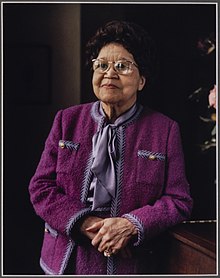
Her maternal grandfather was Benjamin Tucker Tanner (1835–1923), a bishop in the African Methodist Episcopal Church (AME) and editor of the Christian Recorder. Bishop Tanner and his wife had seven children, including Henry Ossawa Tanner (1859–1937), who became a noted painter, and Hallie Tanner Johnson, the first female physician to practice medicine in Alabama[4] and who established the Nurses’ School and Hospital at the Tuskegee Institute in Alabama.[5]
Her father, Aaron Albert Mossell II (1863-1951), was the first African-American graduate of the University of Pennsylvania School of Law and practiced as a lawyer in Philadelphia. In 1899, when his daughter Sadie was 1 year old, he abandoned his family and moved to Wales.[9] Her uncle, Nathan Francis Mossell (1856–1946) was the first African-American graduate of the University of Pennsylvania School of Medicine.[5]
Mossell Alexander’s siblings include Aaron Albert Mossell III (1893–1975), who became a pharmacist; and Elizabeth Mossell (1894–1975), who became a Dean of Women at Virginia State College, a historically black college.[5]
During her high school years, Mossell lived in Washington, DC with her uncle, Lewis Baxter Moore, who was dean at Howard University.
On November 29, 1923, Sadie Tanner Mossell married Raymond Pace Alexander (1897–1974) in her parents’ home on Diamond Street in North Philadelphia, with the ceremony performed by her father. Alexander, the son of slaves, grew up in Philadelphia. He attended and graduated from Central High School (1917, valedictorian), Wharton School of the University of Pennsylvania (1920), and Harvard Law School (1923). At the time of this marriage, he had established a law practice in Philadelphia.
Sadie and Raymond had four premature children, with only the last two surviving. They were able to raise two daughters:[4] Mary Elizabeth Alexander (born 1934), who married Melvin Brown; and Rae Pace Alexander (born 1937), who earned a PhD. and married Archie C. Epps III. After her divorce with Epps, in 1971 Rae Pace Alexander married Thomas Minter, and they had two sons together.[10]
Views

According to Nina Banks,[12] Alexander’s opposition to racial oppression was within a tradition of 19th century scholars Frederick Douglass and T. Thomas Fortune, and with later scholars W.E.B. DuBois and A. Philip Randolph. Alexander’s focus was frequently on racial and economic justice for the working class, especially for working men and women. However, unlike Dubois or Randolph, Alexander never embraced socialism. Alexander also can be contrasted with Howard University radicals Ralph Bunche, E. Franklin Frazier, and fellow black economist Abram Harris. For example, Harris wrote that the fundamental problems facing blacks could be overcome through multi-racial labor organizing and did not support direct action for civil rights until blacks had achieved economic power. Alexander, on the other hand, was outspoken against white dominance in political, social, and economic spheres.[12]
Alexander’s work and views are recorded in speeches kept in the University of Pennsylvania archives. Among her earliest works are from the 1920s and discuss black workers in the US economy. In 1930, Alexander published an article, “Negro Women in Our Economic Life”, which was published in Urban League’s Opportunity magazine advocating black women’s employment, particularly in industrial jobs. Alexander generally supported the Republican Party, suspicious of the control of conservative southern whites over the Democratic Party, although she also criticized Republican political appointments, as well as what she saw as uneven benefits of the New Deal which did not do enough to help blacks who were most hurt by the great depression. During World War II, Alexander saw similarities in a rise in racial violence and discrimination in the US as paralleling the treatment of Jews in Germany. Near the end of the war, she supported integrating labor unions to increase their bargaining power once the war economy slowed and industrial employment moved toward pre-war levels. Her interest in labor economic issues extended to advocating of government regulation to smooth fluctuations in the business cycle, modification of tariffs, regulation of public utilities, and regulation of securities and securities markets.[12]
After the war she was appointed to Truman’s Presidential Committee on Human Rights and shifted her focus to civil and human rights. Evidence in the archives suggests that her focus was in this direction for over a decade. In 1963 she gave a speech to the Annual Conference of Commission on Human Rights and she returned to the topic of economic justice, advocating for universal employment.[12]
In a 1981 interview she did with the Geriatric Nursing journal about her position as chair of the WHCoA, Alexander expressed her disapproval of anti-abortion legislation. She advocated for better benefits for nurses and stressed their vitality to the healthcare system. She also expressed that everyone, no matter their age or educational level, can add value to the economy with the proper support.[4]
Legacy and honors

- In 1948, the National Urban League featured Alexander as “Woman of the Year” in its comic book of Negro Heroes.[5]
- In 1970, Alexander was finally granted membership into Phi Beta Kappa, and honor she had been denied as an undergraduate at University of Pennsylvania.[13]
- In 1974, Alexander was awarded an honorary doctorate by the University of Pennsylvania, her first of seven such honors[8]
- In 1980, Alexander received the Distinguished Service Award from the University of Pennsylvania’s Law School.[4]
- An elementary school in West Philadelphia, the Sadie Tanner Mossell Alexander University of Pennsylvania Partnership School (“Penn Alexander”), is named after her. The public school was developed in partnership with the University, which supports the school financially and academically.
- The Raymond Pace and Sadie Tanner Mossell Alexander Professorship at the University of Pennsylvania is named in her honor.[14]
- In 2018, The Sadie Collective, an organization for Black Women in quantitative fields was created in her honor, hosted the first U.S. conference for Black Women in Economics in 2019, drawing attention from press outlets such as NPR, Forbes, Bloomberg, and Quartz as well as notable economists like Janet Yellen, former Chair of the Federal Reserve System, and James Poterba, current president and CEO of the NBER. The conference was attended by her daughter, Dr. Rae Pace Alexander-Minter, and took place at Mathematica Policy Research‘s Washington D.C. office.[15]
Source: Wikipedia





